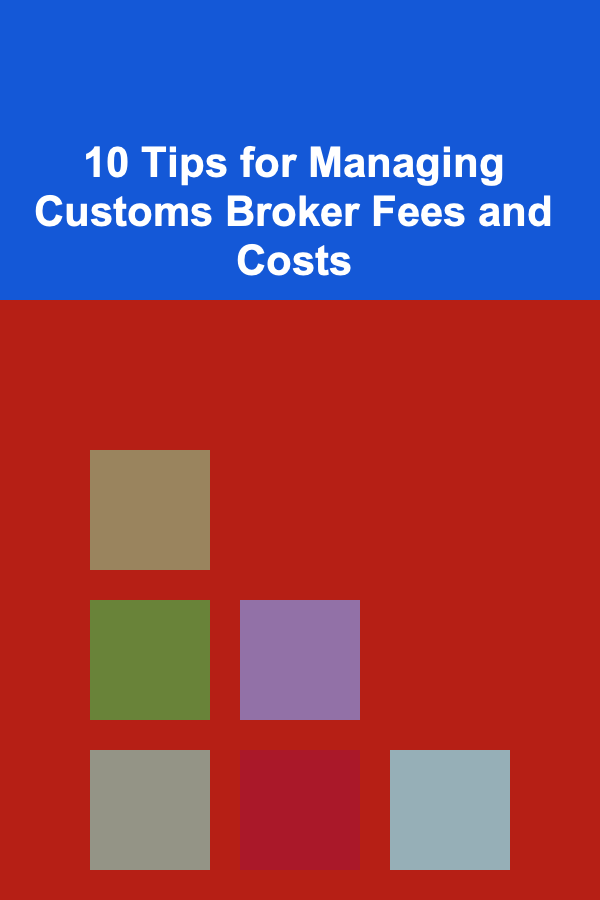
10 Tips for Managing Customs Broker Fees and Costs
ebook include PDF & Audio bundle (Micro Guide)
$12.99$9.99
Limited Time Offer! Order within the next:

When it comes to importing or exporting goods, managing customs broker fees and costs effectively is crucial to maintaining profitability. Customs brokers act as intermediaries between importers and government authorities, ensuring that goods pass through customs in compliance with all applicable regulations. However, the services provided by customs brokers come at a cost, and these fees can add up quickly if not carefully managed. In this article, we'll explore 10 essential tips for managing customs broker fees and costs while ensuring that your business remains competitive and compliant with all legal requirements.
Understand the Different Types of Customs Broker Fees
The first step in managing customs broker fees is to understand the different types of charges that may be applied. Customs brokers typically charge a combination of flat fees, hourly rates, and percentage-based fees, depending on the services rendered. Here are the most common types of fees you may encounter:
- Customs Entry Fee: This fee is charged for the processing of the customs entry paperwork, including classification, valuation, and tariff determination.
- Disbursement Fees: Brokers may charge a disbursement fee for paying duties, taxes, or other fees on your behalf.
- Consultation Fees: Some brokers charge a fee for consultations regarding regulatory compliance, classification disputes, or tariff classifications.
- Additional Services Fees: These can include fees for handling special shipments such as hazardous materials, perishables, or items subject to import/export quotas.
Understanding the structure and nature of these fees allows you to anticipate the costs involved in using a customs broker and helps you avoid surprises later in the process.
Get Multiple Quotes and Compare Fees
Just like any service, the cost of hiring a customs broker can vary significantly from one provider to another. To ensure that you are getting the best deal, it's important to obtain quotes from multiple customs brokers and compare their fees and services. Keep in mind that while the lowest price may seem attractive, the quality of service is equally important. You need a broker who is reliable, experienced, and knowledgeable about the specific regulations and requirements of your trade.
When comparing quotes, consider the following factors:
- Service Offerings: Does the broker offer a comprehensive range of services, or are there hidden fees for additional services?
- Reputation and Experience: An experienced broker may charge slightly higher fees but can often save you money in the long run by ensuring compliance and avoiding costly mistakes.
- Fee Transparency: Look for brokers who provide a detailed breakdown of their fees so that you understand exactly what you're paying for.
Negotiate Broker Fees and Service Terms
Once you have received quotes and selected a potential customs broker, don't be afraid to negotiate the terms of their fees. Customs broker fees are not always set in stone, and many brokers are willing to offer discounts or flexible terms to attract and retain customers.
Some strategies for negotiating broker fees include:
- Long-Term Relationship: If you anticipate a high volume of imports or exports, propose a long-term relationship that includes discounted rates for repeated business.
- Package Deals: Some brokers offer package deals for frequent shipments or bundled services, which may save you money over time.
- Volume Discounts: If your business deals with large volumes of goods, ask for a volume discount or inquire about discounted rates for bulk services.
By approaching negotiations strategically, you can reduce broker fees and secure more favorable terms for your business.
Choose the Right Type of Customs Broker
There are different types of customs brokers, including large multinational firms, regional brokers, and specialized brokers. Choosing the right type of broker depends on the complexity of your shipping needs, the frequency of your imports or exports, and your business's specific requirements.
Types of Brokers:
- Large Multinational Firms: These brokers typically offer a full suite of services, including customs clearance, shipping, logistics, and compliance consulting. They may charge higher fees but can handle complex, high-volume shipments efficiently.
- Regional or Niche Brokers: Smaller, regional brokers may charge lower fees but offer more personalized services. They may be particularly suited for businesses with specific needs, such as those importing goods from a particular region or industry.
- Specialized Brokers: Some brokers specialize in specific industries or types of goods, such as perishable goods or hazardous materials. They may have expertise in handling complex regulatory requirements, but their fees may be higher.
By selecting the right type of broker, you can align the cost of services with the complexity and volume of your shipments.
Leverage Technology to Streamline the Process
In today's digital world, many customs brokers offer online tools and software that can help streamline the customs process, reducing both the time and cost involved. By leveraging these tools, you can cut down on the administrative burden and reduce broker fees associated with manual processing.
Some examples of how technology can help manage customs broker costs include:
- Automated Document Management: Many brokers provide online platforms for submitting and tracking documents electronically, which reduces paperwork and manual labor costs.
- Real-Time Tracking and Updates: Online tracking systems allow you to monitor the status of your shipments and receive real-time updates on customs clearance, reducing the need for follow-up calls or emails.
- Integrated Compliance Tools: Some brokers offer integrated compliance software that helps ensure your shipments meet all customs regulations, reducing the risk of delays or fines.
Using technology can enhance efficiency, lower administrative costs, and enable faster processing of shipments, ultimately reducing the fees charged by your customs broker.
Minimize Errors to Avoid Additional Costs
Errors in the customs clearance process can lead to significant delays, fines, and additional costs. Common mistakes include incorrect classification of goods, incorrect tariff codes, and failure to submit required documentation. These errors not only result in delays but also often incur additional charges from your customs broker for handling corrections.
To minimize errors and avoid incurring extra costs, follow these best practices:
- Double-Check Documentation: Always ensure that your customs broker has the correct and complete documentation for each shipment, including invoices, packing lists, and certificates of origin.
- Verify Tariff Classifications: Ensure that your goods are correctly classified according to the Harmonized System (HS) code to avoid misclassification penalties.
- Maintain Accurate Records: Keeping accurate and organized records of your shipments can help prevent errors and facilitate smoother customs clearance.
By working closely with your customs broker and taking steps to minimize errors, you can avoid unnecessary costs and improve the efficiency of the customs process.
Plan Ahead for Customs Clearance
Rushed shipments and last-minute decisions can result in costly delays and additional broker fees. Customs clearance requires time to process documents, review compliance, and conduct inspections. To minimize fees associated with rushed processing, always plan ahead and allow sufficient time for customs clearance.
Some tips for planning ahead include:
- Submit Documents Early: Provide your customs broker with all required documentation well in advance of the estimated arrival date.
- Be Aware of Deadlines: Ensure you are aware of any deadlines associated with customs clearance, such as payment of duties or taxes.
- Avoid Weekend or Holiday Delays: Be mindful of customs office closures during weekends or holidays, as these may cause delays in the processing of your shipment.
By planning ahead and giving your broker ample time to handle your shipments, you can reduce the risk of costly last-minute charges.
Stay Informed About Regulatory Changes
Customs regulations can change frequently, and staying informed about these changes is essential for managing your costs. New tariffs, trade restrictions, or changes to duty rates can impact the cost of importing goods. If your customs broker is not up to date on regulatory changes, it could result in errors, fines, or unnecessary costs.
To stay informed about regulatory changes:
- Monitor Trade Policy Updates: Stay updated on trade policies and tariffs through government websites or industry associations.
- Work with a Knowledgeable Broker: Choose a customs broker who is proactive about keeping clients informed about changes in regulations that may affect their shipments.
- Invest in Compliance Training: If you manage your own import/export operations, consider investing in compliance training or consulting to better understand the complexities of customs regulations.
Being proactive in staying informed about regulatory changes helps prevent unexpected costs and ensures that your shipments remain compliant.
Consider Using a Customs Broker with a Flat Fee Structure
While some brokers charge based on hourly rates or a percentage of the shipment value, others offer flat fee structures. A flat fee structure can provide more predictability and transparency in terms of cost, making it easier to manage your budget.
Flat fees are typically charged for specific services, such as customs entry, clearance, or consultation. By working with a customs broker that offers a flat fee structure, you can avoid unexpected charges that arise from hourly billing or commissions based on the value of the goods.
If you're looking for greater cost control, seek out brokers who offer flat fees for the services you require, ensuring that you know exactly what you will pay upfront.
Evaluate Broker Performance Regularly
Lastly, it's important to regularly evaluate the performance of your customs broker. This ensures that you are not only getting value for money but also maintaining a high level of service. If you find that your current broker is consistently charging higher fees, causing delays, or making errors, it may be time to seek out alternatives.
Some ways to evaluate broker performance include:
- Customer Feedback: Solicit feedback from internal stakeholders or clients to assess the overall experience with the customs broker.
- Cost Comparison: Periodically compare the fees of your current broker with those of other brokers in the market to ensure competitiveness.
- Performance Metrics: Set measurable performance indicators, such as processing time and accuracy, to track how efficiently your broker is handling shipments.
By conducting regular performance reviews, you can identify areas for improvement and ensure that you're getting the best value for your investment in customs brokerage services.
Conclusion
Managing customs broker fees and costs is an essential aspect of international trade. By understanding the different types of fees, obtaining multiple quotes, negotiating terms, and leveraging technology, you can minimize expenses while ensuring that your shipments are handled efficiently and in compliance with regulations. Additionally, by staying informed about regulatory changes, planning ahead, and regularly evaluating your broker's performance, you can maintain a competitive edge and avoid unnecessary costs. With these tips in mind, you can optimize your customs clearance process, reduce fees, and ensure smooth, cost-effective international trade operations.
Reading More From Our Other Websites
- [Gardening 101] How to Choose the Perfect Garden Book for Your Gardening Style
- [Organization Tip 101] How to Create a Family Command Center for Schedules
- [Organization Tip 101] How to Organize Fine China and Crystal Stemware
- [Personal Care Tips 101] How to Add Moisture to Your Skin with Body Wash
- [Personal Care Tips 101] How to Incorporate Face Masks into Your Daily Skincare Routine
- [Personal Care Tips 101] How to Switch to an Eco-Friendly Toothbrush for a Greener Smile
- [Hiking with Kids Tip 101] Best Trail Games and Scavenger Hunts That Teach Kids About Ecosystem Diversity
- [Organization Tip 101] How to Create a Personal Library at Home
- [Biking 101] Top 5 Bike Pumps Every Cyclist Should Have in Their Gear
- [Organization Tip 101] How to Set Up a Jewelry Repair Station at Home

Becoming a Successful Maintenance Technician: Best Practices for Preventative Maintenance
Read More
How to Install a Home Security System on Your Own
Read More
How to Repurpose and Reuse Items for Home Decoration on a Budget
Read More
How to Use Natural Elements in Your Holiday Home Decor
Read More
How to Navigate the Bustling Markets of Marrakech
Read More
10 Tips for Sales Managers New to Leadership Roles
Read MoreOther Products

Becoming a Successful Maintenance Technician: Best Practices for Preventative Maintenance
Read More
How to Install a Home Security System on Your Own
Read More
How to Repurpose and Reuse Items for Home Decoration on a Budget
Read More
How to Use Natural Elements in Your Holiday Home Decor
Read More
How to Navigate the Bustling Markets of Marrakech
Read More